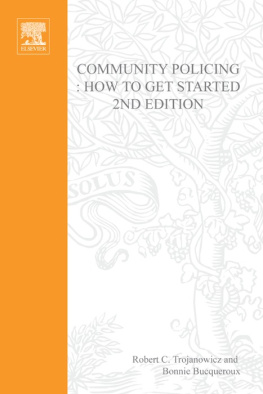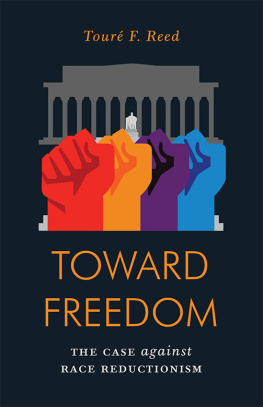THE POLITICS OF
COMMUNITY POLICING
CURRENT ISSUES IN CRIMINAL JUSTICE
VOLUME 25
ROUTLEDGE REFERENCE LIBRARY OF SOCIAL SCIENCE
VOLUME 1179
THE POLITICS OF
COMMUNITY POLICING
THE CASE OF SEATTLE
WILSON EDWARD REED
First Published by Routledge
270 Madison Ave, New York NY 10016
2 Park Square, Milton Park, Abingdon, Oxon, OX14 4RN
Transferred to Digital Printing 2010
Copyright 1999 by Wilson Edward Reed
All rights reserved
Library of Congress Cataloging-in-Publication Data
Reed, Wilson Edward.
The politics of community policing : the case of Seattle / by Wilson Edward Reed.
p. cm. (Garland reference library of social science ; v. 1179. Current issues in criminal justice ; v. 25 )
Includes bibliographical references and index.
ISBN 0-8153-3029-4 (alk. paper)
1. Community policingWashington (State)Seattle. 2. Law enforcementWashington (State)Seattle. 3. Seattle (Wash.)Social conditions. 4. Seattle (Wash.)Politics and government. I. Title. II. Series: Garland reference library of social science ; v. 1179. III. Series: Garland reference library of social science. Current issues in criminal justice ; v. 25.
HV7936.C83R44 1999
363.2309797772dc21
98-45478
CIP
Cover photograph of West Precinct Bicycle Squad Officers at Harborview Viewpoint. Photograph by Officer Terri MacMillan, used by permission of the Seattle Police Department.
Publishers Note
The publisher has gone to great lengths to ensure the quality of this reprint but points out that some imperfections in the original may be apparent.
Contents
Series Editors Foreword
Although the wide-scale implementation of various forms of community policing throughout the last two decades has probably led us no closer to the resolution of the fundamental questions about the impossible police mandate, the prioritization of goals and the allocation of diminishing resources, it is remarkable for its popularity and political utility. Any movement of mass appeal, such as community policing, seems to generate from a particular set of sociopolitical conditions which may tell us as much about our process of problem-solving as our values and ideals. In this work, Edward Reed details the mechanics of the community policing experience in Seattle. Because of the scope of the community policing experience, the characters and the events of this work probably parallel those of other cities and towns all across America. In a very comprehensive analysis Reed explores the effect of the community policing package on the citizen, on citizen groups, on the police organization and on the greater political system.
As with the other volumes in this series, readers will appreciate the clear and compelling way this case study is presented. Reed critiques the way in which political and economic dynamics not only threaten, but convolute the intended benefits of community policing. Although you may not always agree with the authors interpretations, he has given us a compelling look at the potential for corruption of model programs. This work rounds out the work on policing in this series and nicely complements previous volumes by Bernadette Palombo and Otwin Marenin.
Marilyn D. McShane
Frank P. Williams III
Preface
Community policing is an increasingly influential approach to law enforcement that has been defined by its proponents as a model partnership between citizens and police. The basic characteristic of community policing in its radical form is personalized policing where a given officer patrols the same area on a permanent basis, operates from a decentralized mini-station or storefront, and works with citizens to identify and solve crime problems. This study examines how the police department in Seattle, Washington, maneuvered through political pressures to create what has come to be defined as a model for community policing, and it asks how closely this model program fits the ideal of community policing.
It is suggested that the shift to a community policing model occurred because of the perceived failure of traditional police control strategies, which were aimed at slowing the crime rate. Moreover, the actual practice of community policing in Seattle was the result of the interaction between the community and police department politics, rather than the simple bureaucratic implementation of a rational strategy of crime control.
This analysis utilizes three theoretical approaches to understand and illuminate the politics of community policing in Seattle, Washington, from 1985 to 1993. First, legitimation theory is used to analyze the broader fiscal issues of the state government. Sidney Harring (1983) professes that the legitimation function of the police is important because it has an internal effect as well as an external one. Moreover, the police institution gains legitimacy when it makes some accommodations to the communities being policed.
Second, urban political processes are used to address the social and political issues of Seattle, such as crime increases, drugs, and street crime. Finally, micro-organizational processes provide insight into how traditional bureaucratic organizations resist change, adapt, negotiate, compromise, or co-opt crime control strategies in concert with neighborhood and community-based organizations. Peter K. Manning (1977:139) helps one understand the police organization. He notes that organizations are in many ways constituted as a series of negotiated situations in which persons acting within organizational roles confront and make sense of a shared event.
Using Seattle as an example, it is apparent that multiple political and economic forces shape policing strategies, and that police departments are placed in a reactive mode when called upon to manage and control crises and pressures not of their making in large metropolitan cities. This case study concluded that political pressure from community groups played an important role in shaping the variant of community policing eventually implemented in Seattle. Evidence uncovered from this study showed that community policing teams were highly symbolic and political rather than meaningful agents of crime control and prevention.
THE POLITICS OF
COMMUNITY POLICING
CHAPTER 1
Introduction
COMMUNITY POLICING TO THE RESCUE
It is time for America to make a serious commitment to community policing, to having people back on the beat, working the same neighborhoods, making relationships with people in ways that prevent crime.
Bill Clinton, Detroit, Michigan, October 17, 1992
In 1992, candidate Bill Clinton gave national recognition to the concept of community policing during his presidential campaign. As president of the United States, he has tried to sell it as one solution to the crime problem, and has credited community policing as one of the reasons for the downward turn in crime statistics.
Community policing has been described by some politicians, academicians, and law enforcement officials as the solution to the crime problem in the United States. Trojanowicz (1991) contends that community-oriented policing curbs police brutality. He argues that if the Los Angeles Police Department had a true form of community policing, it could have avoided the Rodney King incident. Goldstein (1993) claims that it is inconceivable that a police officer imbued with community policing would engage in the type of behavior illustrated in the beating of Rodney King.






